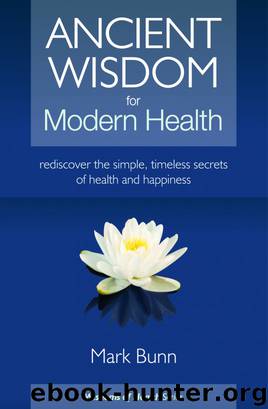Ancient Wisdom for Modern Health by Mark Bunn

Author:Mark Bunn
Language: eng
Format: epub
Tags: alternative health, natural health, complementary medicine, eastern medicine, ayurveda, natural weight loss, mind and body health, ayurvedic medicine, ayurvedic diet, ancient health sciences
Publisher: Mark Bunn
What's possible with an intelligent food diet - the long-living Okinawans
Ishoku-dogan
an Okinawan saying that means ‘Food and medicine have the same source’.
The Southern Japanese prefecture of Okinawa is home to the world’s most thoroughly researched long-living population. Until recently, elderly Okinawans enjoyed not only what was the world’s longest life expectancy but also the world’s longest health expectancy.17 Unlike the long-living Hunzans, Vilcabambans and Abkhasians, whose ages are often over-inflated, the accuracy of the Okinawans’ longevity is unquestionable as their ages are validated through the koseki, the Japanese family registration system.
Despite becoming highly industrialized, and thus missing out on many of the pristine, unpolluted environmental conditions most other long-living cultures enjoy, the Okinawans have been renowned for their longevity. They have had up to five times the number of centenarians found in most developed countries.18 More importantly, elderly Okinawans have commonly remained healthy, strong and vital beyond 100 years of age. Even at such ages they have continued to farm, be active and play with their great-great-grandchildren—often up until the last year or so of their lives.
The authors of the world famous Okinawa Centenarian Study showed the Okinawans had among the lowest mortality rates in the world. Coronary heart disease risk was up to 80% less than in the United States. They also had 80% less prostate and breast cancer, more than 50% less colon and ovarian cancer, 40% fewer hip fractures as well as a lower incidence of strokes, dementia, menopausal difficulties and a range of other age-related problems.19 In one case, an autopsy on a female centenarian showed that her coronary arteries were ‘virtually free of atherosclerotic plaque’.20
While common factors such as heredity, regular exercise, strong social and family bonds and relatively stress-free living are given for the remarkable ageing of the Okinawans, one of the most distinguishing reasons cited is their exceptionally simple and healthful diet. So successful is this way of eating, a book based on its principles, ‘The Okinawa Diet Plan’, has become a best seller.21 Traditionally, in addition to consuming a low number of total calories generally, the Okinawan diet was based on:
* minimal or no processed foods (i.e. predominantly ‘whole foods’)
* almost entirely fresh, seasonal and locally grown produce (high ‘life-force’)
* a high proportion of their diet as healthy complex carbohydrates—whole grains, fruits and vegetables
* various nuts and seeds
* regular small intakes of fresh fish, but minimal meat or eggs
* a good ‘variety’ of foods generally22
It seems no coincidence that the people who enjoyed one of the longest properly verified life expectancies also consumed one of the most naturally intelligent diets. Unfortunately, things are changing. In a 2003 review of the longevity and diet in Okinawa, as reported in the Asia Pacific Journal of Public Health, the authors note that Okinawans now have life expectancies no higher than the national average for Japan. In their discussion of possible reasons for this change, they note that between 1988 and 1998, the daily intake of meat had increased while the daily intake of pulses and
Download
This site does not store any files on its server. We only index and link to content provided by other sites. Please contact the content providers to delete copyright contents if any and email us, we'll remove relevant links or contents immediately.
The Compound Effect by Darren Hardy(8964)
Wonder by R.J. Palacio(8579)
Atomic Habits: Tiny Changes, Remarkable Results by James Clear(8342)
Becoming Supernatural by Dr. Joe Dispenza(8214)
Wonder by R. J. Palacio(8108)
Change Your Questions, Change Your Life by Marilee Adams(7780)
The Road Less Traveled by M. Scott Peck(7601)
Born to Run: by Christopher McDougall(7125)
Daring Greatly by Brene Brown(6512)
Big Magic: Creative Living Beyond Fear by Elizabeth Gilbert(5771)
Grit by Angela Duckworth(5614)
The Slight Edge by Jeff Olson(5416)
Men In Love by Nancy Friday(5239)
The Wisdom of Sundays by Oprah Winfrey(5160)
You Are a Badass at Making Money by Jen Sincero(4929)
Fear by Osho(4734)
The Miracle Morning by Hal Elrod(4727)
The Four Tendencies by Gretchen Rubin(4600)
Rising Strong by Brene Brown(4459)
